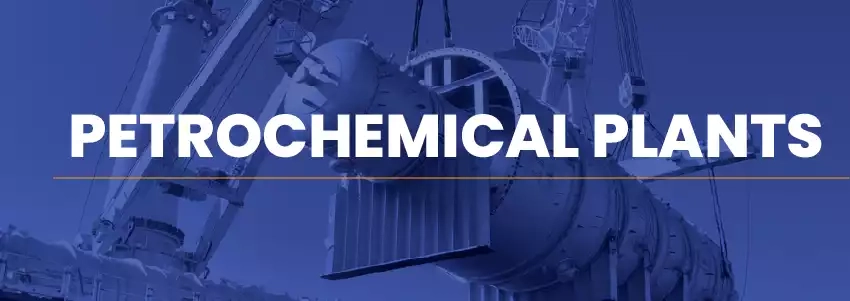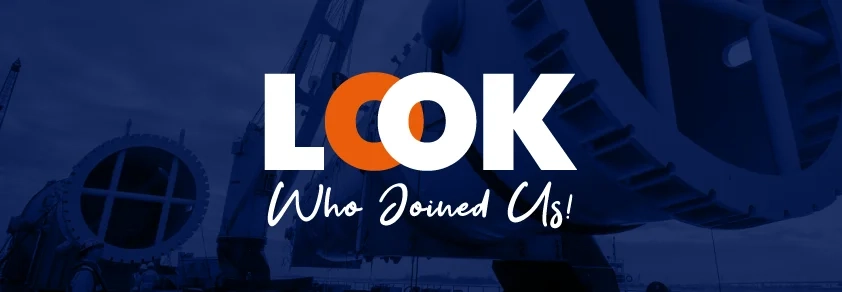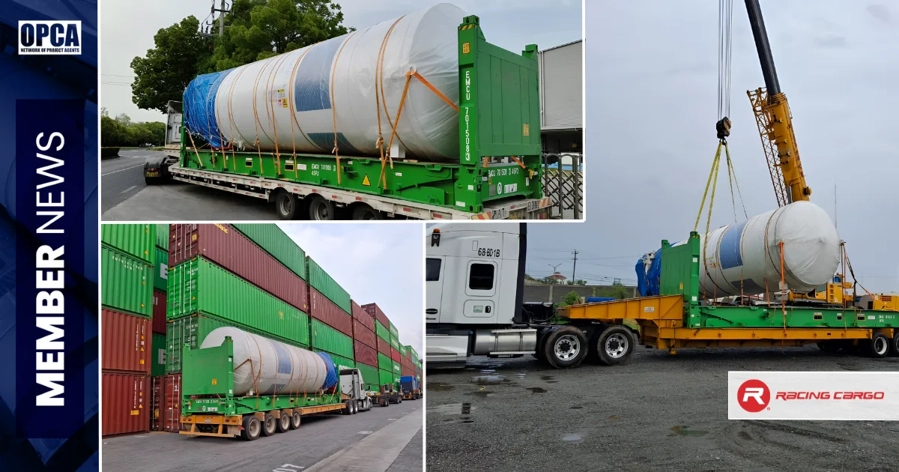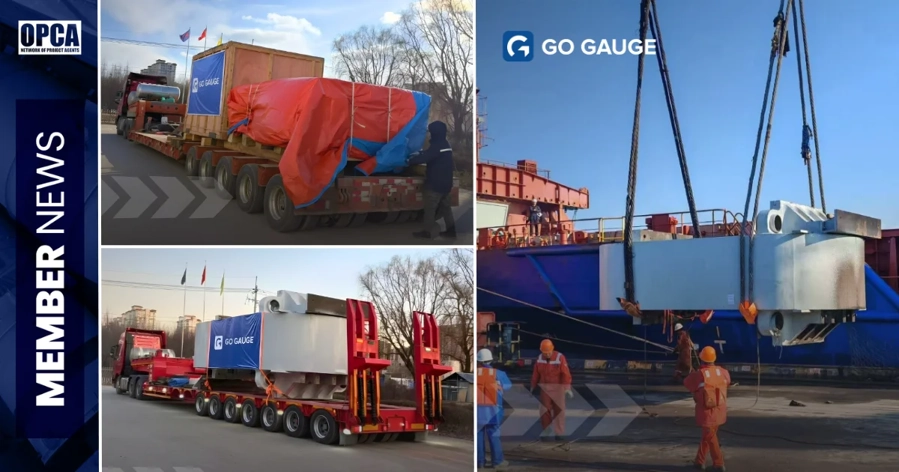List of Petrochemical Plants Forwarders in OPCA
The petrochemical industry is a critical pillar of the global economy, responsible for producing chemicals derived from petroleum and natural gas. From raw materials like crude oil to end products such as plastics, fertilizers, and detergents, the efficient logistics of petrochemical products is essential. Project cargo freight forwarders play a key role in managing these complicated and often oversized shipments, which require careful planning and execution.
As part of the Overseas Project Cargo Association (OPCA), a global network of project cargo freight forwarders and logistics companies, petrochemical plants can benefit from a robust logistics infrastructure that ensures the safe and efficient shipping of large, heavy, and specialized cargo. OPCA members are experienced in managing shipments across all modes of transport, including air freight, sea freight, rail freight, and ground freight, ensuring that oversized cargo reaches its destination on time and within budget.
OPCA's Petrochemical Freight Network consists of highly specialized logistics companies capable of handling the unique challenges of transporting petrochemical components, such as reactors, pipe racks, and stripper columns, which are often oversized and require specialized transport solutions.
OPCA members offer services such as:
Heavy Lift Cargo Handling: Specialized equipment like cranes and barges for transporting oversized petrochemical equipment.
Multimodal Transport Solutions: Integrated transport options using air, sea, rail, and land freight to ensure efficiency and cost-effectiveness.
Customs and Compliance Management: Expertise in navigating the complex international regulations and documentation for hazardous and oversized cargo.
Joining OPCA's network allows petrochemical companies to tap into a global logistics community equipped to handle the specific challenges posed by this industry.
Join OPCA's Petrochemical Plants Freight Network!
As the global demand for petrochemical, oil and gas products continues to rise, so does the complexity of transporting critical components and finished goods. For companies involved in petrochemical production, having access to a reliable and efficient logistics network is more important than ever.
By joining OPCA’s Petrochemical Plants Freight Network, members gain access to a world of opportunities. The network is designed to streamline the shipping of heavy, oversized, and hazardous petrochemical equipment, offering a competitive edge in the increasingly challenging logistics landscape.
OPCA members benefits and advantages from:
Global Reach: With a presence in over 100 countries, the members have local expertise to tackle logistics challenges wherever they arise.
Expertise in Project Cargo: Freight forwarders within OPCA specialize in handling oversized and heavy lift cargo, ensuring that your petrochemical equipment is transported safely and on time.
Safety and Compliance: OPCA members follow strict safety protocols, adhering to international standards for transporting hazardous materials like chemicals and petroleum products.
In addition to the above advantages, OPCA’s Petrochemical Freight Network helps optimize costs, minimize delays, and enhance overall operational efficiency for petrochemical companies.
Compare Petrochemical Plants Freight Forwarders
When selecting a freight forwarder for transporting petrochemical equipment and goods, it's crucial to consider key factors such as experience, specialization, and cost efficiency. OPCA’s members are some of the most reputable project cargo freight forwarders in the industry. They have the expertise to manage the complexities involved in moving petrochemical cargo, including compliance with safety regulations, handling hazardous materials, and managing oversized components.
Key Considerations When Comparing Freight Forwarders:
Industry Experience: Look for freight forwarders with a proven track record in handling petrochemical projects, including the transportation of reactors, columns, and other heavy equipment.
Multimodal Capabilities: Choose a logistics partner who can offer integrated transportation solutions, using rail, sea, air, and road transport to optimize delivery times and costs.
Safety and Compliance: Ensure the freight forwarder complies with industry regulations regarding hazardous cargo, and has strong safety protocols in place.
Customs Expertise: The freight forwarder should be well-versed in managing the documentation and regulations for international shipping, ensuring smooth customs clearance.
Technology Integration: Freight forwarders who utilize advanced technologies such as IoT tracking, data analytics, and digital platforms can enhance visibility, improve supply chain efficiency, and reduce costs.
OPCA members are skilled in overcoming logistical challenges exclusive to the petrochemical industry, ensuring smooth operations and timely delivery of critical cargo.
The Role of Petrochemical Plants in Global Trade
Petrochemical plants play a central role in the global trade of essential materials that drive industries ranging from agriculture and automotive to consumer goods and construction. The products manufactured at these plants—such as plastics, fertilizers, and chemicals—are the building blocks of modern life and are in high demand across the world.
However, transporting petrochemical products and equipment comes with its own set of challenges. These plants often produce large quantities of hazardous, bulky, or delicate materials, requiring specialized transport services. In this context, project cargo freight forwarders become indispensable, offering tailored solutions for moving large petrochemical equipment like refining units, heat exchangers, and reactors, often across long distances and through multiple modes of transport.
Petrochemical plants are a driving force in the global economy, and their contribution to trade relies heavily on the efficient and safe transportation of products. Effective logistics solutions help these plants maintain continuous operations and meet market demands, ensuring that products are delivered on time, every time.
Frequently Asked Questions (FAQs) About Petrochemical Plants Shipments
What makes project cargo logistics different for the petrochemical industry?
The petrochemical industry often deals with oversized, heavy, and hazardous cargo. This requires specialized transport equipment, a thorough understanding of safety protocols, and expertise in handling complex international regulations. Freight forwarders in this industry must also manage the logistics of moving materials across various modes of transport, from land to sea to air.
How do OPCA members help in the transportation of hazardous petrochemical products?
The members adhere to strict safety standards and compliance regulations to transport hazardous petrochemical products. They ensure proper packaging, secure handling, and the right documentation for international shipments, which minimizes the risk of accidents and ensures regulatory compliance.
What transportation methods are used to move large petrochemical components?
Petrochemical components, such as reactors and pipe racks, often require multimodal transport solutions. This could include a combination of sea freight (using heavy-lift ships), rail, road, or even air freight, depending on the size, urgency, and location of the delivery.
What role do technology and digitalization play in petrochemical logistics?
Advanced technologies such as IoT, data analytics, and digital supply chain management platforms enable better tracking, route optimization, and real-time monitoring. This improves visibility, reduces costs, and ensures on-time delivery of petrochemical products, which is crucial for the efficiency of the global petrochemical supply chain.
How can petrochemical plants reduce supply chain costs and delays?
By partnering with experienced project cargo freight forwarders, petrochemical plants can optimize their supply chain through better route planning, multimodal transport solutions, and leveraging technology for tracking and efficiency. Furthermore, strong relationships with logistics partners can help overcome regulatory hurdles and ensure timely deliveries.
_logo.webp)



